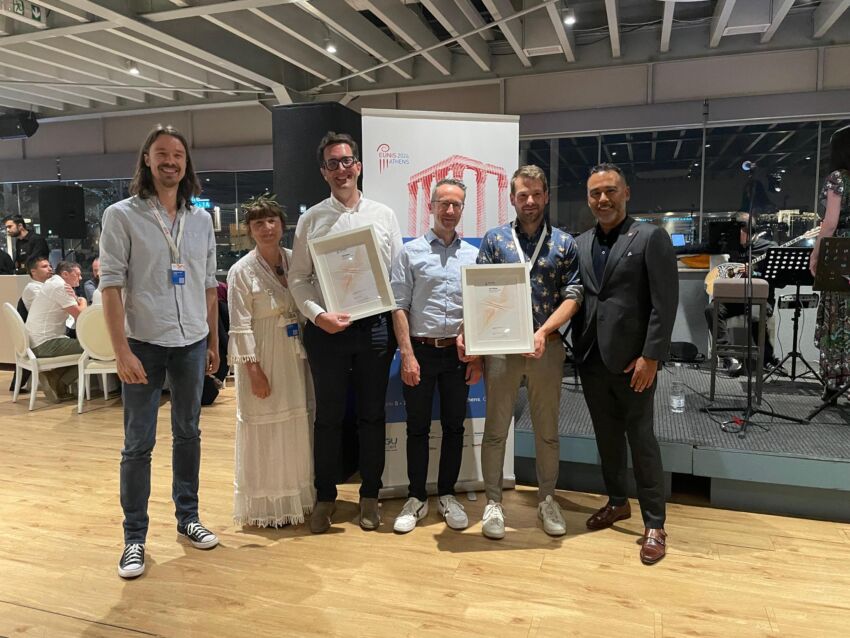The Data Science Lab at the Joint Research Center Zeeland (JRCZ) has won an important award at the international EUNIS conference. Lab manager Loek van der Linde, Data Science lector Mischa Beckers, and project leader Jorick Vos received the award for the Best Overall AV-enabled Education Space on Thursday in a packed hall in the Greek capital, Athens. “We are incredibly proud.”
They already knew they had achieved something special at the JRCZ in Middelburg in close collaboration with the Belgian company Ocular. “Since it opened, we have had a lot of visitors,” says a happy Mischa. “Recently, more than forty lecturers from the national platform for practice-oriented ICT research visited. They were extremely enthusiastic. Some even said it was unique to have something like this in the Netherlands. Now, we are also receiving international recognition from a jury that hasn’t even visited the lab in Middelburg. That is very special.”
Digital Ecosystems
EUNIS is a conference about intelligent digital ecosystems for European universities. It started on Wednesday and ends on Friday. Numerous speakers from various countries give lectures and workshops on topics such as AI, Business Intelligence, and digital transformation. Mischa, Loek, and Jorick told the story of the Data Science Lab. “It's nice to stand there as representatives of a relatively small university of applied sciences from the south of the Netherlands. It shows that we have done something great with the freedom we were given to develop the lab with just a few frameworks,” says Jorick.
The trio’s story made an impression in Athens. “We always knew we were doing something innovative. During development, we had to come up with and improvise a lot,” says Jorick. “Our goal was to translate something complex like data science into a lab with visually appealing setups, so that data science becomes understandable for people who have no affinity with it,” adds Mischa. “We prioritize user-friendliness.”
Phone Ringing
As the lab manager, Loek plays an important role in the lab’s success. “I tell our story everywhere, both within HZ, Scalda, and University College Roosevelt and externally to companies and organizations. That pays off. The lab is busy with students almost every day, my phone is ringing off the hook with interested companies calling, we can accommodate many interns, and there are several projects ongoing.”
According to Loek, the lab adds a new dimension to education and research. “For example, HBO ICT students have developed a digital anatomy model for the Nursing program. Students usually practice on mannequins, but the number of mannequins is limited, so you can’t always practice. With the digital model, you can practice 24/7 and anywhere. In the lab, we are good at making complex processes understandable without compromising the complexity of certain topics. That resonates.”
According to Mischa, the JRCZ lab is unique in its kind. There are similar initiatives in the Netherlands, but they are often just collections of equipment. “In our lab, we can visually explain the data science process. Once the 3D-curved wall works optimally, you will literally be in the middle of it. Then we can clearly tell our story to everyone in a beautiful way.”
Four Criteria
The Best Overall AV-enabled Education Space is the most prestigious award given during the conference of the European University Information Systems organization (EUNIS). This organization brings together people responsible for the management, development, and policy of IT in higher education in Europe. The JRCZ Data Science Lab was evaluated on four components: pedagogy, AV technology, innovation, and benefits. The jury said that the technology adds value in terms of learning and teaching in the spaces. “The design is innovative, goes beyond standard classrooms, and contributes to learning objectives.”

